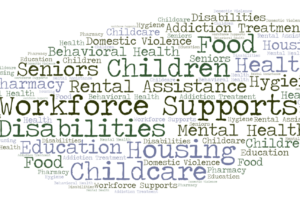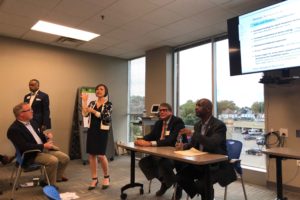HSC members will gather at City Hall next Tuesday at noon to urge City Council to allocate a majority of its remaining American Rescue Plan funds for human services and affordable housing.
Earlier this week, Council voted to approve over $134M in American Rescue Plan (ARP) funds, leaving only ~$35M for important economic recovery supports such as human services grants and affordable housing in 2021. The allocation Council approved included $106M to stabilize the City’s finances, $4M for bars and restaurants, $2M for outdoor dining areas, $2.5M for minority business supports, and $7M for arts organizations. Additional ARP funds that the City received from the U.S. Department of Housing and Urban Development will go to affordable housing ($9.9M) and healthcare ($9.9M).
HSC originally requested $50M for the affordable housing trust fund and $25M for human services operational grants. The only human services-related funding that was allocated was a restoration of $2M in human services funding that the City cut last spring.

Two of the most important supports our community needs to recover from the pandemic are human services and affordable housing. These needs are especially dire for lower-income residents.
Investing in Affordable Housing
The need to expand our inventory of affordable housing for lower income residents is critical. The City is short thousands of units. We must invest a significant portion of these one-time funds to make a strong headway on building these affordable units as soon as possible so that individuals and families have a safe place to call home.
Strengthening the Human Services Sector
The nonprofit human services sector is a critical part of the social infrastructure of our City, helping our residents in times of need and providing opportunities for people to reach their highest potential. Yet, due to pandemic-related funding losses, many of these organizations continue to experience financial difficulty and inadequate staffing at a time when our community needs them most.
According to a recent report from University of Cincinnati’s Kautz-Uible Economics Institute, Cincinnati-based human services organizations lost 760 jobs between February 2020 and September 2020. At $15/hour, these job losses are valued at over $23M annually.
At the same time, some of these organizations have seen their demand for services grow exponentially over the course of the pandemic. As examples, the Urban League has seen a 70% increase for workforce-related support services among residents who have not previously sought assistance, while Freestore Foodbank has distributed 46% more meals to struggling residents.
As federal assistance becomes available, human services organizations will be needed to assist residents access these benefits. This is often a staff-intensive process, and the grants often do not cover the cost of providing additional staff. As a result, funding to residents can be delayed. A prime example of this is with rental assistance funds through the CARES Act. Due to the lack of staffing capacity, residents were placed on long waiting lists to access the benefits or in some cases were not able to access the benefits at all.
The strength of the nonprofit human services sector has helped local governments weather the COVID-19 crisis. These nonprofits need flexible operating support to add the personnel, equipment and facilities required to support our residents and help our community rebound in the years ahead. American Rescue Act funds can be leveraged to fortify the human services sector so that it is prepared to help our community recover quickly and efficiently.
.







